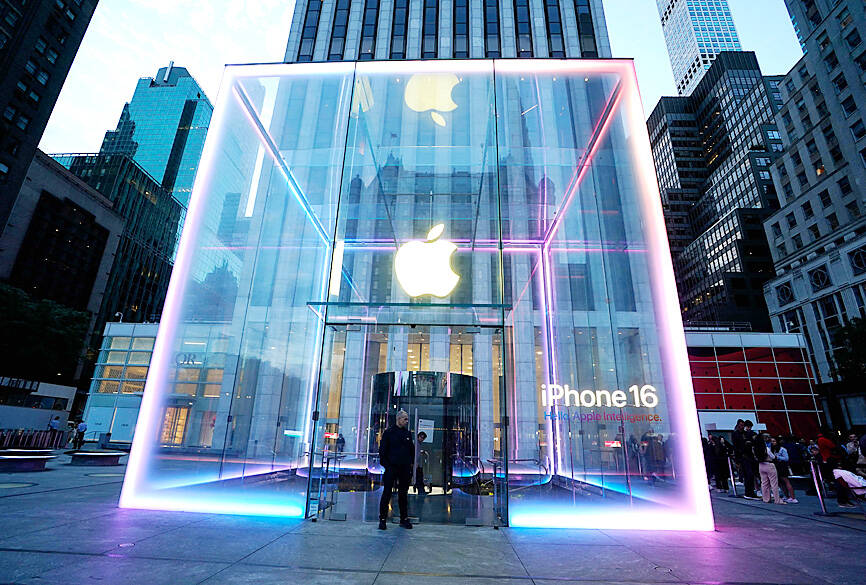Apple Inc has approached its biggest iPhone supplier, Hon Hai Precision Industry Co (鴻海精密), also known as Foxconn Technology Group (富士康科技集團) internationally, about building artificial intelligence (AI) servers in Taiwan, the Nikkei Asia reported on Tuesday, citing sources familiar with the matter.
The servers are intended for Apple’s internal use to help it ramp up its computing capability, so the size of the order would likely be relatively small, the report said.
In addition, Hon Hai’s capacity to take on Apple as a server customer might be limited, as the Taiwanese firm is also the leading manufacturer of Nvidia Corp’s AI servers, it said.

Photo: AFP
Late last month, Apple rolled out its first set of Apple Intelligence features across its premium iPhone, iPad and Mac devices after revealing its AI capability at the company’s developers conference in June.
To allow more consumers to embrace the company’s generative AI features, Apple needs to rely on its manufacturing partners to build the necessary hardware for this goal.
While Apple and Hon Hai have entered into discussions, no agreement has been finalized yet, the report said.
Apart from Hon Hai, Apple has also approached Chinese firm Lenovo Group Ltd (聯想), the world’s largest PC maker, and its subsidiary, LCFC (Hefei) Electronics Technology Co (聯寶科技), to help in designing some of the AI servers, the Nikkei Asia reported.
There is a possibility that more players might enter Apple’s supply chain for this server production plan, as the US tech giant is looking to smaller suppliers, such as Universal Scientific Industrial Co (環旭電子), to provide additional production capacity, the report said.
Still, nothing is set in stone right now, it added.

When an apartment comes up for rent in Germany’s big cities, hundreds of prospective tenants often queue down the street to view it, but the acute shortage of affordable housing is getting scant attention ahead of today’s snap general election. “Housing is one of the main problems for people, but nobody talks about it, nobody takes it seriously,” said Andreas Ibel, president of Build Europe, an association representing housing developers. Migration and the sluggish economy top the list of voters’ concerns, but analysts say housing policy fails to break through as returns on investment take time to register, making the

NOT TO WORRY: Some people are concerned funds might continue moving out of the country, but the central bank said financial account outflows are not unusual in Taiwan Taiwan’s outbound investments hit a new high last year due to investments made by contract chipmaker Taiwan Semiconductor Manufacturing Co (TSMC, 台積電) and other major manufacturers to boost global expansion, the central bank said on Thursday. The net increase in outbound investments last year reached a record US$21.05 billion, while the net increase in outbound investments by Taiwanese residents reached a record US$31.98 billion, central bank data showed. Chen Fei-wen (陳斐紋), deputy director of the central bank’s Department of Economic Research, said the increase was largely due to TSMC’s efforts to expand production in the US and Japan. Investments by Vanguard International

WARNING SHOT: The US president has threatened to impose 25 percent tariffs on all imported vehicles, and similar or higher duties on pharmaceuticals and semiconductors US President Donald Trump on Wednesday suggested that a trade deal with China was “possible” — a key target in the US leader’s tariffs policy. The US in 2020 had already agreed to “a great trade deal with China” and a new deal was “possible,” Trump said. Trump said he expected Chinese President Xi Jinping (習近平) to visit the US, without giving a timeline for his trip. Trump also said that he was talking to China about TikTok, as the US seeks to broker a sale of the popular app owned by Chinese firm ByteDance Ltd (字節跳動). Trump last week said that he had

STRUGGLING TO SURVIVE: The group is proposing a consortium of investors, with Tesla as the largest backer, and possibly a minority investment by Hon Hai Precision Nissan Motor Co shares jumped after the Financial Times reported that a high-level Japanese group has drawn up plans to seek investment from Elon Musk’s Tesla Inc to aid the struggling automaker. The group believes the electric vehicle (EV) maker is interested in acquiring Nissan’s plants in the US, the newspaper reported, citing people it did not identify. The proposal envisions a consortium of investors, with Tesla as the largest backer, but also includes the possibility of a minority investment by Hon Hai Precision Industry Co (鴻海精密) to prevent a full takeover by the Apple supplier, the report said. The group is